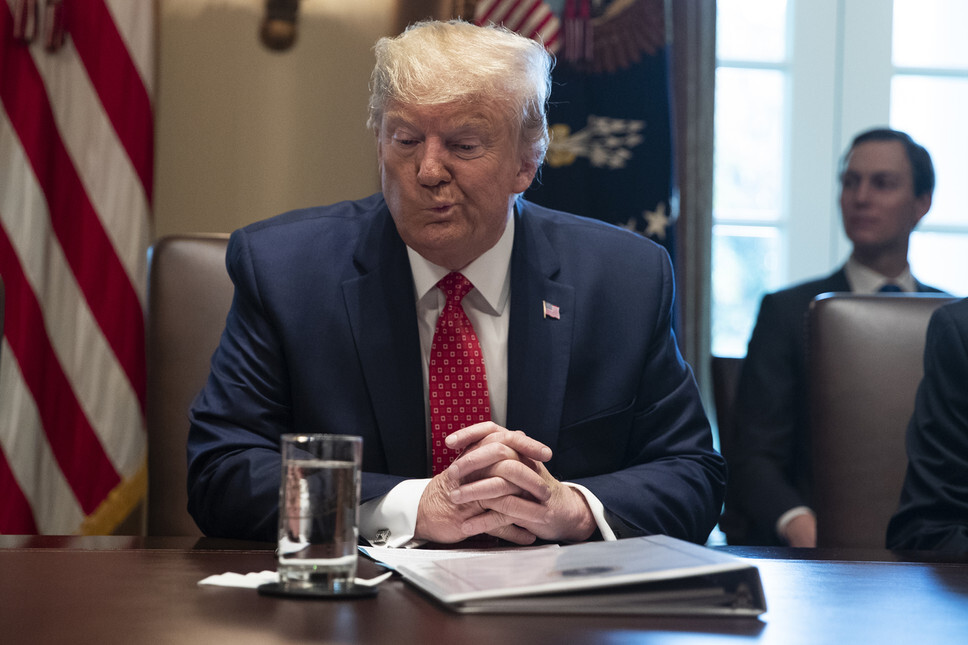 |
|
US President Donald Trump during a Cabinet meeting at the White House on Nov. 19.
|
Experts of different ideological leanings all say US president treats alliances as financial transactions
 |
|
US President Donald Trump during a Cabinet meeting at the White House on Nov. 19.
|
“It’s ridiculous to ask for a 400% increase.” “He only sees alliances as mafia-like transactional relationships.” “The value of an alliance isn’t calculated in dollars.”
American experts on the Korean Peninsula who spoke with the Hankyoreh on Nov. 19 were united in their criticism of the Trump
administration’s demand for South Korea to hike up its share of the cost of stationing American troops.
The third round of negotiations aimed at updating South Korea and the US’ defense cost-sharing agreement, held in Seoul on Nov. 18-19, came to an abrupt halt when the American delegation walked out of the room. When the Hankyoreh urgently contacted five figures from major Washington think tanks with differing ideological leanings, each of those figures agreed that the American demand is excessive and will damage the South Korea-US alliance. They also raised concerns that Trump could threaten to reduce the American troop presence in the country.
While acknowledging the need for South Korea to raise its defense contribution in light of its economic and military strength, the experts said that Trump has gone too far this year in calling for a 400% increase in the amount that South Korea pays. The US is reportedly pushing for nearly US$5 billion in the negotiations.
“South Korea is already at the top of US allies in terms of its capabilities, its domestic defense budget, and its cost-sharing contribution. It’s ridiculous to ask the hosting country to raise its contribution by 400%,” said Michael E. O’Hanlon, senior fellow at the Brookings Institution.
“It doesn’t make sense to throw out figures without any mutual agreement about the formula [for calculating the defense contribution],” observed Frank Aum, a senior expert with the United States Institute of Peace.
The current 11th Special Measures Agreement (SMA) specifies that the categories of costs for which South Korea is responsible are wages for Koreans employed by US Forces Korea (USFK), military construction costs, and materiel support costs. But the US is reportedly seeking to engineer a huge increase in funding by adding categories that include the cost of supporting military contractors and their families, rotating American troops in for deployments on the Korean Peninsula, and holding military exercises off the peninsula.
This criticism is especially intense because the US’ demand reflects Trump’s tendency to regard alliances purely as monetary transactions and because this could lead to a change in a decades-long American strategy.
“The continuing tension that’s endangering the ROK-US alliance originates from Trump’s disrespect for alliances. He thinks of alliances as real estate deals. Everything is a mafia-like transactional relationship,” said Robert Manning, a resident fellow at the Atlantic Council.
Bruce Klingner, senior research fellow at the Heritage Foundation, offered some stinging criticism. “Alliances are not a transactional relationship, but are based on shared values and goals. The value of an alliance isn’t measured in dollars and cents. The longstanding motto of the South Korea-US alliance, forged in blood during the Korean War, is ‘we go together,’ not ‘we’ll go with you if we get paid enough.’”
David Maxwell, a senior fellow at the Foundation for Defense of Democracies, said, “The basic question is whether the US wants an alliance structure based on shared interests, values, and strategies, or if it is trying to change to a transactional alliance system based solely on the hosting country’s levels of funding.”
Some predicted the Trump administration’s attitude toward the alliance could end up leading to USFK reductions. Noting former White House National Security Advisor John Bolton’s recent remarks that the US could exit NATO is Trump is re-elected, Manning suggested Trump’s demands to substantially increase South Korea’s share of USFK defense costs may be intended to justify a “homecoming of US troops stationed overseas” during his second term.
Klingner predicted, “If the defense cost talks get bogged down, Trump could start making statements during the election campaign about ‘reducing USFK troops unless we get a 100% guarantee.’”
“The North Korea threat hasn’t diminished, and US forces should not be reduced,” he insisted.
Alternatives to Trump’s unreasonable demands
Experts also proposed concrete alternatives, maintaining that a gradual increase would be the best solution.
Aum said, “The matter of abruptly changing the formula for sharing costs is not something that can be resolved in just a couple of months.”
“As a first step, we should extend the current one-year agreement and begin negotiations toward deciding on a new formula that is acceptable to both sides,” he suggested.
Maxwell said, “If they want to create new support items, the Status of Forces Agreement (SOFA) needs to be amended first for a fair and equal agreement on cost sharing to be reached.”
The US’ current demands are being interpreted as an attempt to circumvent Article 5 of SOFA, which sets out the terms for sharing costs associated with the maintenance of USFK. Manning said, “The situation between South Korea and the US doesn’t change in some major way every 12 months. It’s nonsense to have to renegotiate the sharing of costs every year.”
“The agreement should be on a three-year or five-year basis. South Korea might propose a formula that involves raising the amount by such-and-such percent every year,” he suggested.
By Hwang Joon-bum, Washington correspondent
Please direct comments or questions to [english@hani.co.kr]










